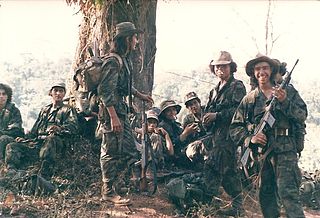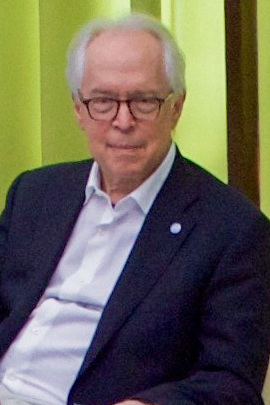
The Contras were the various U.S.-backed and funded right-wing rebel groups that were active from 1979 to 1990 in opposition to the Marxist Sandinista Junta of National Reconstruction Government in Nicaragua, which came to power in 1979 following the Nicaraguan Revolution. Among the separate contra groups, the Nicaraguan Democratic Force (FDN) emerged as the largest by far. In 1987, virtually all Contra organizations were united, at least nominally, into the Nicaraguan Resistance.
Nicaragua is a nation in Central America. It is located about midway between Mexico and Colombia, bordered by Honduras to the north and Costa Rica to the south. Nicaragua ranges from the Caribbean Sea on the nation's east coast, and the Pacific Ocean bordering the west. Nicaragua also possesses a series of islands and cays located in the Caribbean Sea.

The Republic of Nicaragua v. The United States of America (1986) was a case where the International Court of Justice (ICJ) held that the U.S. had violated international law by supporting the Contras in their rebellion against the Sandinistas and by mining Nicaragua's harbors. The case was decided in favor of Nicaragua and against the United States with the awarding of reparations to Nicaragua.

The Organization of American States is an international organization founded on 30 April 1948 to promote cooperation among its member states within the Americas. Headquartered in Washington, D.C., United States, the OAS is a "multilateral regional body focused on human rights, electoral oversight, social and economic development, and security in the Western Hemisphere," according to the Council on Foreign Relations. As of June 2023, 35 states in the Americas are OAS members. Since the 1990s, the organization has focused on election monitoring. Luis Almagro was inaugurated as OAS secretary general in 2015.

The Reagan Doctrine was stated by United States President Ronald Reagan in his State of the Union address on February 6, 1985: "We must not break faith with those who are risking their lives—on every continent from Afghanistan to Nicaragua—to defy Soviet-supported aggression and secure rights which have been ours from birth." It was a strategy implemented by the Reagan Administration to overwhelm the global influence of the Soviet Union in the late Cold War. The doctrine was a centerpiece of United States foreign policy from the early 1980s until the end of the Cold War in 1991.

The Nicaraguan Revolution encompassed the rising opposition to the Somoza dictatorship in the 1960s and 1970s, the campaign led by the Sandinista National Liberation Front (FSLN) to oust the dictatorship in 1978–79, the subsequent efforts of the FSLN to govern Nicaragua from 1979 to 1990, and the Contra War, which was waged between the FSLN-led government of Nicaragua and the United States–backed Contras from 1981 to 1990. The revolution marked a significant period in the history of Nicaragua and revealed the country as one of the major proxy war battlegrounds of the Cold War, attracting much international attention.

The Organization of Ibero-American States, formally the Organization of Ibero-American States for Education, Science and Culture, is an international organization made up of 23 members states of Iberophone nations in Europe and the Americas, as well as one member in Africa. The OEI's membership is composed of all of the sovereign states of Ibero-America and the Iberian Peninsula, as well as Equatorial Guinea. All members are Portuguese and Spanish speaking nations, in addition to Andorra, which is predominantly Catalan speaking, though the organization does not include all the Iberophone nations of the world.

Robert Edward White was an American career diplomat who served as US Ambassador to Paraguay (1977–1980) and to El Salvador (1980–1981). He then became president of the Center for International Policy.

The National Reorganization Process was the military dictatorship that ruled Argentina from 1976 to 1983, which received support from the United States until 1982. In Argentina it is often known simply as the última junta militar, última dictadura militar or última dictadura cívico-militar, because there have been several in the country's history and no others since it ended.

Historically speaking, bilateral relations between the various countries of Latin America and the United States of America have been multifaceted and complex, at times defined by strong regional cooperation and at others filled with economic and political tension and rivalry. Although relations between the U.S. government and most of Latin America were limited prior to the late 1800s, for most of the past century, the United States has unofficially regarded parts of Latin America as within its sphere of influence, and for much of the Cold War (1947–1991), actively vied with the Soviet Union for influence in the Western Hemisphere.
The Central American crisis began in the late 1970s, when major civil wars and communist revolutions erupted in various countries in Central America, causing it to become the world's most volatile region in terms of socioeconomic change. In particular, the United States feared that victories by communist forces would cause South America to become isolated from the United States if the governments of the Central American countries were overthrown and pro-Soviet communist governments were installed in their place. During these civil wars, the United States pursued its interests by supporting right-wing governments against left-wing guerrillas.
Operation Charly, was allegedly the code-name given to a program during the 1970s and 1980s undertaken by the junta in Argentina with the objective of providing military and counterinsurgency assistance to right-wing dictatorships and insurgents in Central America. According to Noam Chomsky, the operation was either headed by the Argentine military with the agreement of the United States Department of Defense, or was led by the US and used the Argentinians as a proxy.

Canada–Latin America relations are relations between Canada and the countries of Latin America. This includes the bilateral ties between Canada and the individual Latin American states, plurilateral ties between Canada and any group of those states, or multilateral relations through groups like the Organization of American States (OAS).

Friendly Bilateral relations now exist between Nicaragua and the United States. However, in the 19th and 20th centuries, tensions were high and American intervention was frequent. In the 1980s Due to Red Scare paranoia and an attempt to put down socialism in the region, the U.S proceeded to wage an undeclared war against the left-wing Sandinista movement by funding the Contra groups until it was defeated in the election in 1990.

CIA activities in Nicaragua have been ongoing since the 1980s. The increasing influence gained by the Sandinista National Liberation Front, a left-wing and anti-imperialist political party in Nicaragua, led to a sharp decrease in Nicaragua–United States relations, particularly after the Nicaraguan Revolution. In 1981, President Ronald Reagan authorized the Central Intelligence Agency to support the Contras, a right-wing Nicaraguan political group to combat the influence held by the Sandinistas in the Nicaraguan government. Various anti-government rebels in Nicaragua were organized into the Nicaraguan Democratic Force, the first Contra group, at the behest of the CIA. The CIA also supplied the Contras with training and equipment, including materials related to torture and assassination. There have also been allegations that the CIA engaged in drug trafficking in Nicaragua.
The modern history of Honduras is replete with large-scale disappearances of left-leaning union members, students and others. The legislature approved a new constitution in 1982, and the Liberal Party government of President Roberto Suazo Córdova took office. Suazo relied on United States support — including controversial social and economic development projects sponsored by the United States Agency for International Development — during a severe economic recession. According to the US State Department, "Honduras became host to the largest Peace Corps mission in the world, and non-governmental and international voluntary agencies proliferated."

Bernard William Aronson was United States Assistant Secretary of State for Inter-American Affairs from 1989 to 1993.
Founded in 1983, the Latin America Working Group (LAWG) is one of the United States' longest-standing coalitions dedicated to foreign policy. LAWG and its sister organization, the Latin America Working Group Education Fund, work with over 60 major religious, humanitarian, grassroots and policy organizations to influence decision makers in Washington, D.C.
The United States has at various times in recent history provided support to terrorist and paramilitary organizations around the world. It has also provided assistance to numerous authoritarian regimes that have used state terrorism as a tool of repression.
Joan Kruckewitt is an American journalist and writer. Kruckewitt has reported on Latin America and Europe for ABC Radio, Pacifica Radio, RKO, Mutual, NBC, Monitoradio, the Canadian Broadcasting Company, and NPR. She is the author of The Death of Ben Linder: The Story of a North American in Sandinista Nicaragua and has contributed to other books.












